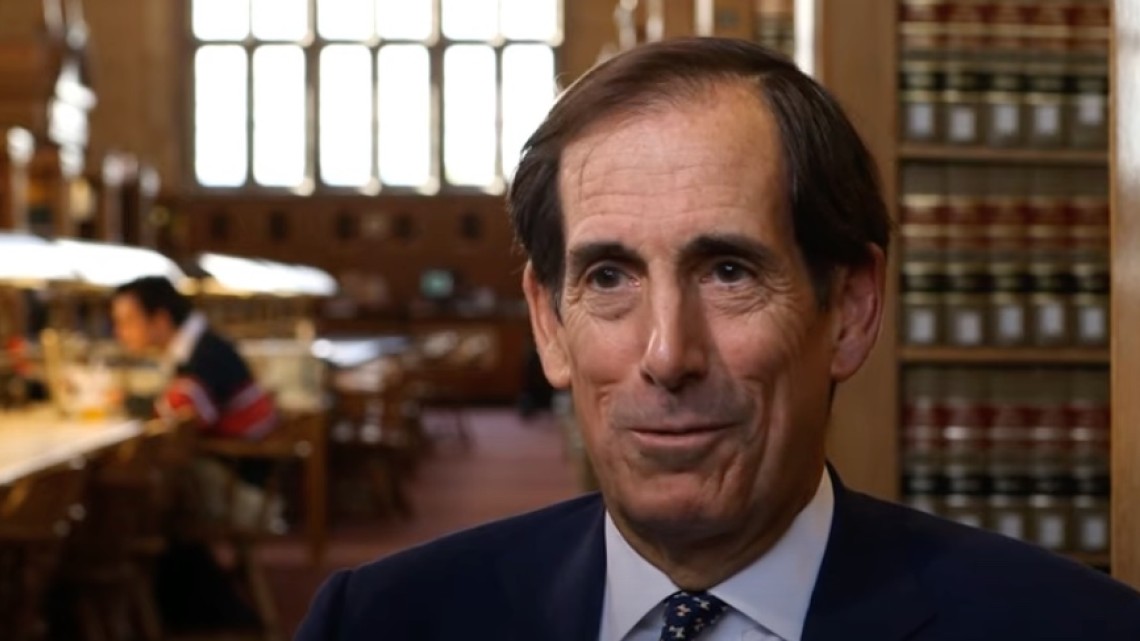
C. Evan Stewart ’74, J.D. ’77 teaches Cornell's Prelaw Program in New York City
News directly from Cornell's colleges and centers
Students explore law in NYC during summer course with internship
By Shelley Preston
Last summer, Evan Hammer, a sophomore economics major contemplating law school, found himself working in the heart of Midtown Manhattan at Cohen and Gresser, LLP.
There, he gained a behind-the-scenes look at what it would be like to practice law at the firm. The internship was a component of Cornell’s Prelaw Program and Internship in New York City, which includes an intense three-week prelaw course taught by one of Cohen and Gresser’s senior lawyers, C. Evan Stewart ’74, J.D. ’77.
“Professor Stewart was one of the best professors I’ve ever had,” said Hammer. “Every day we would talk about a new area of law, such as tort law, contract law or criminal law. It was a great introduction into these complex topics. The course was a lot of work, but I enjoyed learning about so many different areas of the law.” The program, Hammer said, affirmed his interest in going to law school.
For 17 years, Stewart, a distinguished attorney — and author of a recent book about Cornell’s Myron Taylor, a graduate of the Cornell Law School's Class of 1894 — has passionately led the four-credit course The American Legal System (GOVT 3150), offered through the School of Continuing Education and Summer Sessions (SCE).
Stewart views the course as one of the few opportunities for undergraduates to access a real law school-like experience and dive into the culture of practicing the law. He’s known for his charismatic teaching style and his deep conversations about the ethics of practicing law.
“Students should know that this is not a freshman 101, introductory-type class,” said Stewart. “Rather, it’s an attempt to give students a realistic view of what first year law school will be like over a concentrated period of time; it’s exposing them to a type of teaching they are not use to—the Socratic method—and a lot of reading. The experience helps them decide whether law school and a legal career is right—or wrong—for them. Having gone through this experience, they’ll have a leg up on their first-year law school classmates.”
Isabel Hou, a Cornell junior majoring in Industrial and Labor Relations, said, “I appreciated the similarities the course shared with [first year] law courses, including cold calling, case briefings, and assignments on tort, contracts and constitutional law. It was a tremendously valuable opportunity.”
Hou also enjoyed a class trip to New York City’s Second Circuit Court of Appeals to witness oral arguments. “I valued how Professor Stewart intertwined lessons about the challenges of law school and real legal practice into our course sessions,” she said.
The Prelaw Program is open to both Cornell and visiting students. Katharine Lemieux, a senior majoring in applied liberal arts at Boston College, took the course last summer after her prelaw advisor recommended it. “Professor Stewart provided us with insight into the daily life of a lawyer,” she said. “He was brutally honest, which is needed if you decide to pursue law.”
After taking Stewart’s course, students often complete an internship assigned by the program. Many, like Hammer, stay in New York City to work at a law firm or institute. Lemieux interned at Seneca Women, a global leadership platform focused on empowering women and girls, while Hou interned on Cornell’s Ithaca campus in the Office of the General Counsel.
“We were excited by the idea of providing a Cornell student with an inside look at the legal issues facing this university,” said associate general counsel, Adam Pence. “Our general counsel, Donica Varner, really liked the idea of undergraduate students working with our law clerks (current law students) to learn about the practice of higher education law.”
Asked what advice she would give to fellow students considering taking the Prelaw Program, Hou said, “I recommend this course to any student remotely interested in pursuing a legal career, including those interested in government, public policy or litigation,” she said. “It’s all right if you do not have the strongest commitment to a legal career; some students in the course had already taken the LSAT, while others were still exploring their options. I recommend keeping an open mind because preconceived notions about law will be challenged. And, yes, in this program, you will be challenged.”
To learn more about the Prelaw Program in New York City, visit SCE. The deadline for students to apply is April 14. The program runs June 5-July 14, 2023.
Visit SCE News for more stories on programs offered by Cornell's School of Continuing Education.
Shelley Preston is the School of Continuing Education and Summer Sessions’ communications and marketing specialist.
Media Contact
Get Cornell news delivered right to your inbox.
Subscribe
